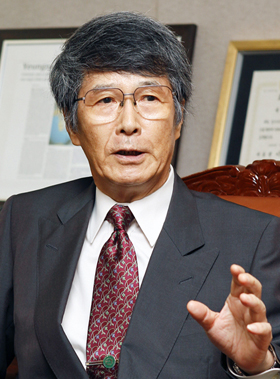YU Attracts 2 core researchers and 8 billion won worth of the high-tech equipment.
YU Constructs the Global research cooperation and the corporate support infrastructure in the medical and bio fields.
YU Starts developing first FDA approved anti-cancer medicine
[August 27, 2012]
Yeungnam University (president Lee, Hyo-soo) hired Kanegasaki Shiro (金ヶ崎 史朗, 74), an honorary professor of the University of Tokyo Medical Science, who is known to be one of the top scholars in the world in the BT field as a endowed chair professor.

Professor Kanegasaki who will begin
working at the YU Department of Nano, Medical and Polymer Materials from the second semester as the 'First Foreign Endowed Chair Professor', is
the founder of ECI (Effector Cell Institute), a listed venture company dealing with stem cells in Japan, and is a prominent figure in terms of development of next-generation anti-cancer medicine and new anti-inflammation drugs. After earning his doctorate's at Tufts University in the US, he worked as a visiting professor at the Max Planck Institute in Germany, and has won a number of awards such as from the Japanese Society for Bacteriology, Japanese Biochemical Society, and International Society of Immunity Deficiency. Furthermore, he
published over 150 theses in prominent international journals including 'The LACENT', which is a top academic journal in immunology equal to 'Science' and 'Cell'. Recently, he
has developed a comprehensive next-generation anti-cancer medicine using the immune system of the human body, and is clinically testing the medicine in both the US and Japan. It is expected that the medicine will be launched in the market within the next several years.
Professor Kanegasaki, who is currently serving as the honorary chairman of ECI, came to YU together with two of his core researchers who he worked with for over ten years, as well as advanced high-tech research equipment and facilities amounting to over 8 billion won. In particular, 'TAXIScan', which can easily measure the cell functions and the cell reaction process for the newly developed drugs, is a cutting-edge equipment that can monitor the movements of cells in real time using special video scanning and was developed by Professor Kanegasaki. The automatic TAXIScan is the one and only equipment of its kind in the world, and a total of four TAXIScan were brought to and installed at YU.
Accordingly, the process for development of new drugs, which does not have any anti-cancer medicine that received FDA approval in Korea yet, was reduced drastically. In particular, it has now become possible for YU to upgrade from the basic research stage for the development of new drugs and medical materials, to the stage for applying them at actual clinical stages. Furthermore, it is expected that the research capacities of participating manpower including graduate school students will be enhanced, and thus effectively foster and supply outstanding human resources needed in the Daegu-Gyeongbuk High-tech Medical Complex. It is also expected to contribute greatly in constructing the infrastructure for the establishment of the 'global open innovation research center' together with business support systems involved in the Daegu High-tech Medical Complex and the YU Polymer Gel Research Cluster Project Team.
Professor Kanegasaki, who is also developing drugs for diseases such as diabetes and dementia, stated, "My goal is to develop the first FDA approved anti-cancer medicine in Gyeongbuk. The research philosophy and accumulated technologies of ECI, with the addition of the creative research personnel of YU, will make it possible to achieve this goal in the near future." He also added, "By allowing many graduate school students to participate in the process of developing new drugs and medical materials, we will allow them to learn about creative research and how they are applied on the field so that they may become core human resources that will guarantee a healthy and happy future for humanity."
YU President Lee, Hyo-soo also stated, "In addition to the capacities of YU school of medicine and YU college of pharmacy that has a long and rich history, the addition of advanced engineering technologies such as BT and IT will be integrated and converged to make YU a hub university that opens new horizons in the medical and bio fields."










